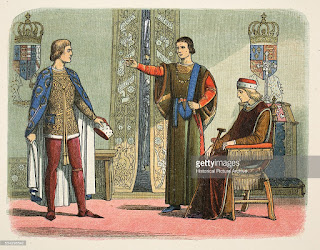Despite what its name sounds like, this wasn't a Medieval version of Woodstock. And, at times, there was nothing loving about it. Feudal society was by its nature both warlike and litigious. People had two means of settling their disputes, either go to war or go to court. Both were risky propositions. A third avenue was arbitration or mediation between the two parties, agreed to by both and either under the auspices of the courts or of the Church. Love in those days could also mean peace and accord. A day could refer to a specific day, or a day set aside by a court for something to happen. Thus, a loveday was a day set aside for all parties to a dispute to come to peace and accord.
The most famous example of a loveday was that held on March 24, 1458, between the warring factions of the Plantagenet family and their various supporters. On the one hand were Henry VI, his wife, Margaret of Anjou, and their young son. On the other side were Richard, Duke of York, the father of four capable sons, Richard "the Kingmaker" Neville, Earl of Warwick, and the Duke of Somerset, himself a descendant of John of Gaunt. The stakes couldn't be higher, who would inherit the English throne. Henry VI, still vulnerable from his last bout with the mental illness that plagued him and a virtual prisoner, had no choice but to agree that Richard of York and his sons would inherited, thereby disinheriting his own son. Of course, this was unacceptable to Margaret of Anjou, who was willing to raise an army in her son's behalf. Fighting resumed in the War of the Roses almost as soon as the ceremony was over.

Hi,
ReplyDeletethank you for your time. With due respect I'd like to know which date is the correct one. I mean, on the internet at about equal number of places I find 25th March as Love-day. I simply can't decide if 24th March or 25th March was the real Love-day in 1458.
Best regards.